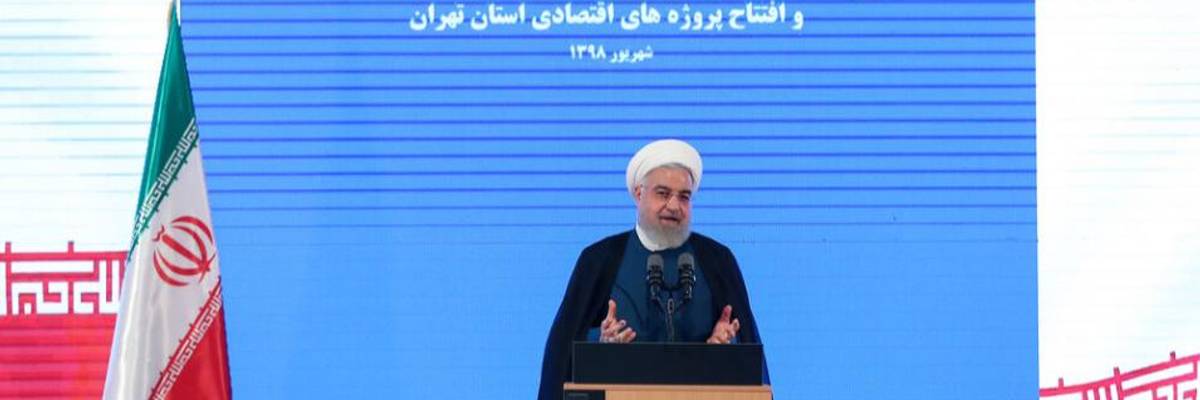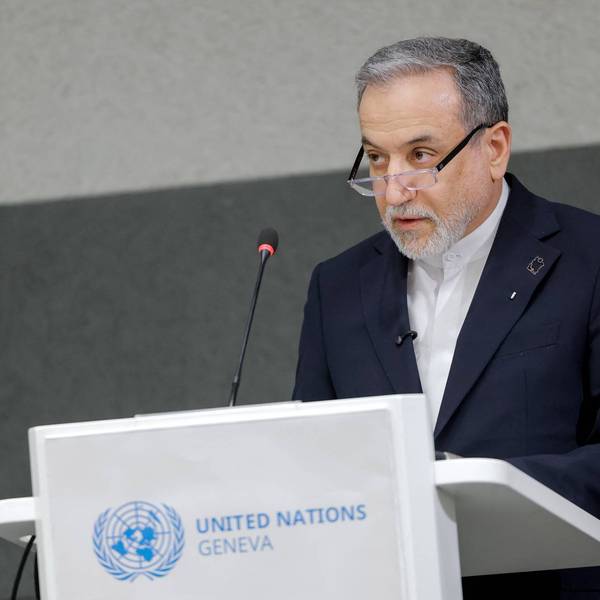
Iranian President Hassan Rouhani speaks in Tehran on August 27, 2019. "We seek to resolve issues and problems in a rational way but we are not after photos," Rouhani said in his remarks. (Photo: president.ir)
Rejecting Idea of 'Photo Op' Diplomacy With Trump, Iran's Rouhani Says No Talks Unless US Sanctions Lifted
"It's possible with PhotoShop—but not in reality. Unless the U.S. removes all the sanctions—then there will be a new situation for us to consider."
Announcing he would not miss a legitimate opportunity to help his "country's development and resolve the problems of the people," Iranian President Hassan Rouhani said Tuesday he would not agree to talks with U.S. officials or President Donald Trump unless "cruel" and "unlawful" economic sanctions are first lifted and that guarantees are made that diplomatic progress--not a mere photo op--is the goal.
"If the U.S. were to impose its will on Europe to abide by international law it would be bad but it would be justifiable. Now the U.S. is imposing will on the rest of the world to violate international law."
--Iranian Foreign Minister Mohammad Javad Zarif
According to the Associated Press:
Rouhani's change of heart came a day after Trump said Monday that there's a "really good chance" the two could meet on their nuclear impasse after a surprise intervention by French President Emmanuel Macron during the G-7 summit to try to bring Washington and Tehran together after decades of conflict.
"Without the U.S.'s withdrawal from sanctions, we will not witness any positive development," Rouhani said in a televised speech on Tuesday, adding that Washington "holds the key" as to what happens next.
"We seek to resolve issues and problems in a rational way but we are not after photos," Rouhani said in his remarks. "For anyone wanting to take a picture with Hassan Rouhani, this is not possible. It's possible with PhotoShop--but not in reality. Unless the U.S. removes all the sanctions--then there will be a new situation for us to consider."
In an interview with Euronews on Monday, Iran's Foreign Minister Mohammad Javad Zarif--who was the one invited to the sidelines of the G7 summit by Macron--said the Trump administration's violation of the international nuclear agreement--officially known as the Joint Comprehensive Plan of Action (JCPOA) and signed by the P5+1 nations in 2015--is a grave threat to the international order.
The deal, Zarif said, is "not an optional arrangement" but one backed by a UN Security Council resolution and a deal that remains an obligation to those countries who signed onto it, even if the U.S. and Iran are no longer standing by their original commitments after Trump ditched the deal in 2017.
"If the U.S. were to impose its will on Europe to abide by international law it would be bad but it would be justifiable," Zarif said. "Now the U.S. is imposing will on the rest of the world to violate international law. That's totally unacceptable, and for Europe, whose future is based on multilateralism and the rule of law, this is a threat against the future of Europe."
Watch the full interview with Zarif:
An Urgent Message From Our Co-Founder
Dear Common Dreams reader, The U.S. is on a fast track to authoritarianism like nothing I've ever seen. Meanwhile, corporate news outlets are utterly capitulating to Trump, twisting their coverage to avoid drawing his ire while lining up to stuff cash in his pockets. That's why I believe that Common Dreams is doing the best and most consequential reporting that we've ever done. Our small but mighty team is a progressive reporting powerhouse, covering the news every day that the corporate media never will. Our mission has always been simple: To inform. To inspire. And to ignite change for the common good. Now here's the key piece that I want all our readers to understand: None of this would be possible without your financial support. That's not just some fundraising cliche. It's the absolute and literal truth. We don't accept corporate advertising and never will. We don't have a paywall because we don't think people should be blocked from critical news based on their ability to pay. Everything we do is funded by the donations of readers like you. Will you donate now to help power the nonprofit, independent reporting of Common Dreams? Thank you for being a vital member of our community. Together, we can keep independent journalism alive when it’s needed most. - Craig Brown, Co-founder |
Announcing he would not miss a legitimate opportunity to help his "country's development and resolve the problems of the people," Iranian President Hassan Rouhani said Tuesday he would not agree to talks with U.S. officials or President Donald Trump unless "cruel" and "unlawful" economic sanctions are first lifted and that guarantees are made that diplomatic progress--not a mere photo op--is the goal.
"If the U.S. were to impose its will on Europe to abide by international law it would be bad but it would be justifiable. Now the U.S. is imposing will on the rest of the world to violate international law."
--Iranian Foreign Minister Mohammad Javad Zarif
According to the Associated Press:
Rouhani's change of heart came a day after Trump said Monday that there's a "really good chance" the two could meet on their nuclear impasse after a surprise intervention by French President Emmanuel Macron during the G-7 summit to try to bring Washington and Tehran together after decades of conflict.
"Without the U.S.'s withdrawal from sanctions, we will not witness any positive development," Rouhani said in a televised speech on Tuesday, adding that Washington "holds the key" as to what happens next.
"We seek to resolve issues and problems in a rational way but we are not after photos," Rouhani said in his remarks. "For anyone wanting to take a picture with Hassan Rouhani, this is not possible. It's possible with PhotoShop--but not in reality. Unless the U.S. removes all the sanctions--then there will be a new situation for us to consider."
In an interview with Euronews on Monday, Iran's Foreign Minister Mohammad Javad Zarif--who was the one invited to the sidelines of the G7 summit by Macron--said the Trump administration's violation of the international nuclear agreement--officially known as the Joint Comprehensive Plan of Action (JCPOA) and signed by the P5+1 nations in 2015--is a grave threat to the international order.
The deal, Zarif said, is "not an optional arrangement" but one backed by a UN Security Council resolution and a deal that remains an obligation to those countries who signed onto it, even if the U.S. and Iran are no longer standing by their original commitments after Trump ditched the deal in 2017.
"If the U.S. were to impose its will on Europe to abide by international law it would be bad but it would be justifiable," Zarif said. "Now the U.S. is imposing will on the rest of the world to violate international law. That's totally unacceptable, and for Europe, whose future is based on multilateralism and the rule of law, this is a threat against the future of Europe."
Watch the full interview with Zarif:
Announcing he would not miss a legitimate opportunity to help his "country's development and resolve the problems of the people," Iranian President Hassan Rouhani said Tuesday he would not agree to talks with U.S. officials or President Donald Trump unless "cruel" and "unlawful" economic sanctions are first lifted and that guarantees are made that diplomatic progress--not a mere photo op--is the goal.
"If the U.S. were to impose its will on Europe to abide by international law it would be bad but it would be justifiable. Now the U.S. is imposing will on the rest of the world to violate international law."
--Iranian Foreign Minister Mohammad Javad Zarif
According to the Associated Press:
Rouhani's change of heart came a day after Trump said Monday that there's a "really good chance" the two could meet on their nuclear impasse after a surprise intervention by French President Emmanuel Macron during the G-7 summit to try to bring Washington and Tehran together after decades of conflict.
"Without the U.S.'s withdrawal from sanctions, we will not witness any positive development," Rouhani said in a televised speech on Tuesday, adding that Washington "holds the key" as to what happens next.
"We seek to resolve issues and problems in a rational way but we are not after photos," Rouhani said in his remarks. "For anyone wanting to take a picture with Hassan Rouhani, this is not possible. It's possible with PhotoShop--but not in reality. Unless the U.S. removes all the sanctions--then there will be a new situation for us to consider."
In an interview with Euronews on Monday, Iran's Foreign Minister Mohammad Javad Zarif--who was the one invited to the sidelines of the G7 summit by Macron--said the Trump administration's violation of the international nuclear agreement--officially known as the Joint Comprehensive Plan of Action (JCPOA) and signed by the P5+1 nations in 2015--is a grave threat to the international order.
The deal, Zarif said, is "not an optional arrangement" but one backed by a UN Security Council resolution and a deal that remains an obligation to those countries who signed onto it, even if the U.S. and Iran are no longer standing by their original commitments after Trump ditched the deal in 2017.
"If the U.S. were to impose its will on Europe to abide by international law it would be bad but it would be justifiable," Zarif said. "Now the U.S. is imposing will on the rest of the world to violate international law. That's totally unacceptable, and for Europe, whose future is based on multilateralism and the rule of law, this is a threat against the future of Europe."
Watch the full interview with Zarif:

